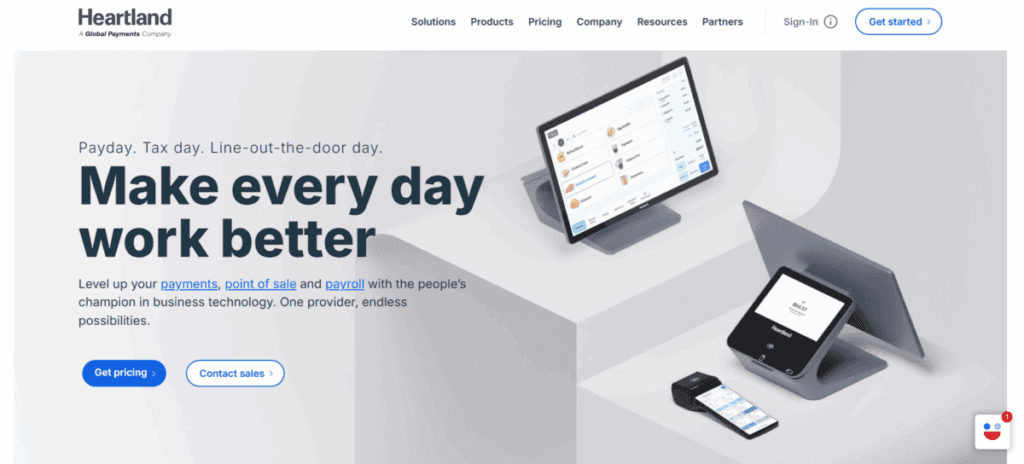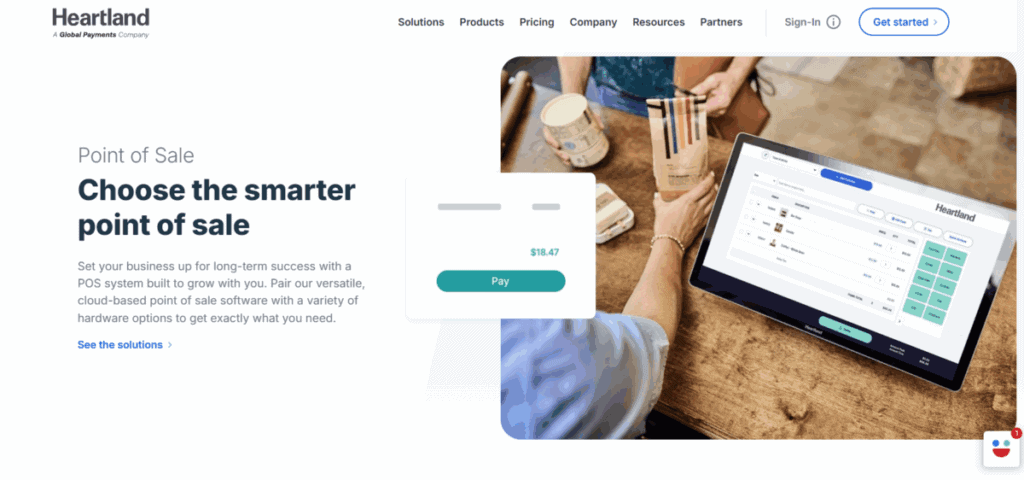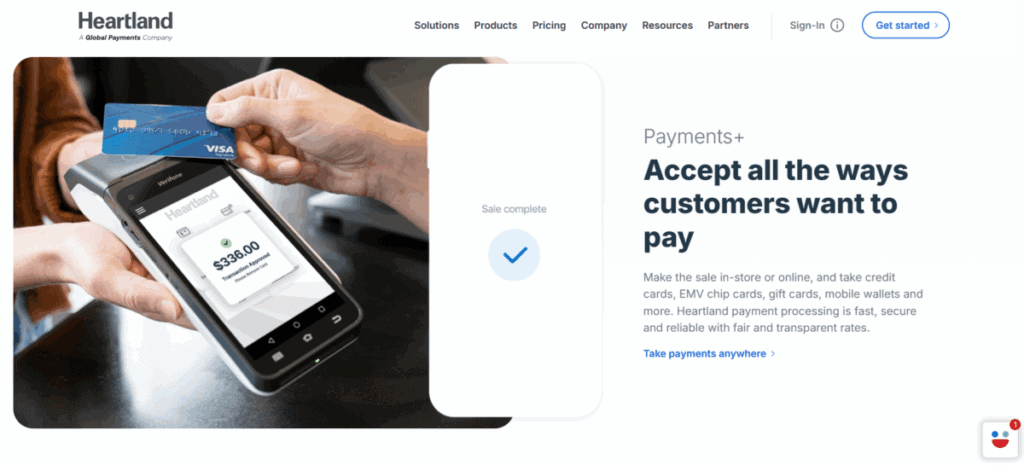
Heartland Payment Systems Review
- 17th Jun, 2025
- | By Linda Mae
- | Reviews
Heartland Payment Systems is a U.S.-based merchant services provider known for supporting small and mid-sized businesses across a wide variety of sectors. Established in 1997 and acquired by Global Payments in 2016, the company has continued to operate under its own brand, maintaining a steady focus on serving traditional business models like retail shops, restaurants, and local service providers. This long-standing presence in the payments industry gives Heartland both credibility and experience in handling evolving business needs. Lets read more about Heartland Payment Systems Review.
The business provides a wide range of services, including payroll solutions, POS systems, customer marketing tools, and credit card processing. Heartland hopes to streamline operations for entrepreneurs who would rather handle all of their financial resources in one location with this all-in-one strategy. Despite the gradual expansion of e-commerce options, their services are specifically designed for physical businesses.
Transparency has always been a core promise of Heartland. The business has emphasised its dedication to transparent pricing and moral business conduct. Independent user reviews, however, show that some merchants have had inconsistent experiences with fees and contracts, pointing to a disconnect between marketing and execution.
Despite these concerns, Heartland remains a popular choice among U.S. businesses seeking integrated payment and business management solutions. Its continued investment in industry-specific features and customer support reflects a desire to stay relevant in a crowded and rapidly evolving market. The company’s wide service offering makes it worth considering, particularly for those looking for an all-in-one provider.
Core Payment Processing Services | Heartland Payment Systems Review
Heartland’s core strength lies in its payment processing capabilities, which serve as the backbone for most of its clients. The company supports all major credit and debit cards, as well as modern payment methods like contactless cards, Apple Pay, Google Pay, and mobile wallets. This flexibility ensures that merchants can cater to a variety of customer preferences at the point of sale.
Transactions are processed quickly and securely, with Heartland leveraging EMV-compliant technology and offering end-to-end encryption and tokenization for added security. This helps businesses protect sensitive customer data and reduces the risk of fraud. Heartland also assists clients with PCI DSS compliance, a crucial requirement for any merchant accepting card payments.
Another notable feature is Heartland’s real-time transaction reporting. Business owners can monitor payments as they occur and access detailed reports via an online dashboard or mobile device. This level of visibility supports better financial oversight and decision-making.
Recurring billing, stored card functionality, and ACH processing are also available for businesses that handle subscriptions or service-based payments. For those operating on-the-go, Heartland provides mobile card readers compatible with smartphones and tablets, extending its utility beyond traditional storefronts.
However, it’s important to note that pricing for payment processing is not uniform across the board. Rates may vary depending on the business type, processing volume, and individual contract terms. Some users have reported unexpected fees or difficulty in understanding the fee breakdown, suggesting that prospective customers should closely review their agreements.
POS Solutions
Heartland offers a range of POS systems designed for businesses in retail, hospitality, and service industries. These POS solutions are not one-size-fits-all. Instead, they’re industry-specific, with customized features aimed at solving particular operational challenges.
For example, restaurants can benefit from POS systems that support table management, tipping, kitchen order printing, and online ordering. Retail businesses, on the other hand, have access to inventory management, barcode scanning, employee permissions, and multi-location support. This targeted approach helps ensure that the tools offered are aligned with real-world workflows.
Card readers, touchscreen terminals, and add-ons like cash drawers and receipt printers are among the hardware that Heartland offers. These devices are usually sleek and contemporary, and the majority of them have cloud connectivity, which enables data syncing and remote access across locations. Heartland also highlights how easy it is to use its software. The learning curve for new hires is reduced by the POS interfaces’ intuitive design. Reporting tools in the backend provide business owners with information about inventory levels, employee performance, and sales trends.
However, some merchants report that POS setup can require technical assistance and that troubleshooting hardware issues may involve delays depending on support availability. Additionally, the cost of hardware and software subscriptions may not always be fully transparent at the time of onboarding. It’s advisable to get a full breakdown of costs before committing.
E-Commerce and Online Payment Capabilities
While Heartland has traditionally focused on in-person transactions, it has steadily built out its online payment capabilities. Today, the platform supports e-commerce businesses with several useful tools including virtual terminals, hosted payment pages, and recurring billing features.
For businesses that need to accept payments online without a full-fledged e-commerce site, the virtual terminal allows manual entry of card information, which is ideal for phone or invoice-based transactions. Hosted payment pages, on the other hand, enable businesses to create branded checkout experiences without advanced technical knowledge.
Heartland also offers APIs and integration capabilities for those looking to connect with platforms like WooCommerce, Shopify, and BigCommerce. This gives online merchants the ability to use Heartland’s gateway services without disrupting their existing website flow. Additionally, businesses can manage subscriptions and set up automated recurring billing. This is particularly useful for service-based industries or companies offering membership programs. Payment data can be tokenized and stored securely, allowing for faster future checkouts.
One limitation is that Heartland may not offer the same depth of e-commerce features as platforms built specifically for online retail. It lacks built-in shopping cart systems or advanced marketing automation found in more digital-native competitors. As such, it may be a better fit for brick-and-mortar businesses expanding online rather than those operating exclusively on the internet.
Payroll and HR Services
Heartland offers payroll and HR services, positioning itself as a full-service business partner rather than just a payment processor. These services are designed to reduce administrative burden and ensure compliance with federal and state labor laws.
Direct deposit, tax computation and filing, wage reporting, and year-end forms such as W-2s and 1099s are all included in payroll services. In addition to having access to cloud-based tools for managing employee records and pay history, businesses can process payroll on a flexible schedule. Self-service portals are also provided to employees, enabling them to view time-off balances, tax documents, and pay stubs.
Heartland’s HR services go above and beyond by providing regulatory compliance advice, onboarding assistance, and time tracking. There are tools for managing workplace policies, employee handbooks, and benefits. For small businesses without a dedicated human resources department, these features are extremely beneficial.
Integration between Heartland’s payroll platform and POS or time-tracking tools can streamline operations further. For example, hourly employee data from the POS system can feed directly into the payroll system, reducing manual entry and error.
One potential drawback is that these services may be priced separately from the core payment processing package. Additionally, some users note that the interface, while functional, can feel outdated compared to newer HR tech platforms. Still, the convenience of bundled services remains a strong point for businesses looking for an all-in-one provider.
Customer Engagement and Loyalty Programs
Heartland provides a set of customer engagement tools designed to help businesses build loyalty and drive repeat visits. These features include digital gift card programs, customizable loyalty rewards, and email marketing campaigns that integrate with customer purchase data. Gift card functionality allows businesses to sell branded cards both online and in-store, with balance tracking and reload capabilities. This can help improve cash flow while offering customers a convenient gifting option.
The loyalty program is flexible, allowing merchants to create point-based rewards, visit-based incentives, or spend thresholds that trigger discounts. These programs can be tailored to suit different industries, whether it’s a coffee shop offering a free drink after ten purchases or a salon rewarding regular customers with exclusive discounts.
Heartland also supports email marketing features, enabling businesses to create segmented campaigns based on customer behavior. This makes it easier to send targeted promotions or service reminders. Campaign performance can be tracked within the platform, helping merchants measure effectiveness. These engagement tools are particularly beneficial when used in conjunction with Heartland’s POS systems. Customer data collected at the point of sale can be used to drive personalized marketing efforts, enhancing the overall customer experience.
However, businesses looking for advanced CRM features or highly customizable campaign automation may find the tools somewhat limited. While Heartland covers the basics well, companies with complex marketing needs might require integration with more specialized platforms.
Industry-Specific Solutions
Heartland positions itself as a versatile provider with tailored solutions for specific industries. This industry-focused approach allows the company to offer tools that directly address the pain points of businesses in foodservice, education, healthcare, retail, and personal services. In the restaurant industry, Heartland’s POS systems support features such as tableside ordering, kitchen display systems, and menu management. For quick-service restaurants, there are solutions optimized for speed and volume, including drive-thru and mobile order integration.
In the field of education, Heartland offers school payment portals and campus card systems that let parents make in-person or online payments for meals, fees and other school-related costs. These tools lessen staff manual labour by integrating with school administration systems. Payment options that support co-pays, recurring treatment billing, and HIPAA-compliant data security are advantageous to healthcare providers. Additionally, there are options for safely storing patient card information and managing payment schedules.
Salons, spas, and fitness centers can take advantage of scheduling tools, recurring membership billing, and customer profile management. These tools are designed to streamline appointment booking and customer retention.
While these industry-specific solutions offer targeted value, they may also lock businesses into proprietary ecosystems, making it harder to switch providers or integrate third-party tools. That said, for businesses that prefer all-in-one convenience, Heartland’s specialized offerings can be a strong selling point.
Pricing and Contract Clarity
Heartland emphasizes transparent pricing as part of its brand promise, yet user experiences on this front are mixed. While the company promotes “fair and honest pricing,” the actual fee structure often varies based on the size and type of business, processing volume, and the sales representative handling the account.
Heartland typically uses an interchange-plus pricing model, which is generally more transparent than flat-rate or tiered models. However, additional fees for monthly services, PCI compliance, early termination, and statement processing may apply. These can add up quickly if not clearly communicated during the onboarding process.
Some merchants have praised Heartland for offering competitive rates and straightforward billing, while others report receiving different fee quotes than initially promised. Complaints about automatic contract renewals and difficulty in canceling services also appear in some online reviews. To ensure clarity, it’s advisable for businesses to request a detailed, itemized quote before signing any contract. Understanding what is included, what is optional, and what may increase over time can help avoid surprises.
Heartland’s pricing may be most attractive to mid-sized businesses with steady volume that can negotiate favorable terms. For very small or seasonal businesses, other providers with more flexible month-to-month options may be a better fit.
Security, Compliance, and Data Protection
Heartland takes payment security seriously and has made considerable investments in protecting both merchants and customers. The company uses end-to-end encryption and tokenization to secure cardholder data from the point of entry through transmission and storage. One standout feature is Heartland Secure, a proprietary combination of encryption, tokenization, and EMV technology designed to protect data and reduce the risk of breaches. This system is paired with breach warranty coverage, which provides financial protection in the event of a data compromise.
The company assists retailers in adhering to PCI DSS standards. This encompasses resources for self-evaluation, security checks, and advice on optimal methods. Not staying compliant can lead to extra charges or penalties, making assistance in this area essential. Payment solutions that comply with HIPAA are accessible for healthcare providers, guaranteeing that patient information is managed in line with federal privacy regulations.
While these measures are robust, it’s still important for businesses to actively manage their own security practices. No system is foolproof, and user error remains a leading cause of data breaches. That said, Heartland’s layered security tools offer meaningful protection in a digital-first business environment.
Customer Support and User Experience
Heartland promotes its U.S.-based customer service as a key differentiator. Support is available 24/7 by phone, and there are additional resources available via the company’s website, including training videos, documentation, and account management tools. Customer reviews about the support experience are mixed. Some businesses report quick, helpful service and a smooth onboarding experience. Others mention long wait times, inconsistent follow-up, or challenges getting issues resolved, particularly when multiple services are bundled together.
The user experience across Heartland’s platforms is generally positive. The interfaces for both POS and payroll systems are relatively easy to navigate, though they may lack the sleek design and advanced features of newer fintech competitors. Mobile accessibility is available, but reviews suggest that the apps could be more robust and responsive.
Another factor is that Heartland’s systems could need additional training compared to plug-and-play options such as Square or Stripe. This holds particularly true for companies that utilize various products such as payroll, POS, and customer interaction tools at the same time. In the end, the customer experience is greatly influenced by the unique configuration of the business and the particular representatives engaged. Companies desiring a personalized connection might discover that Heartland meets their needs, whereas those looking for solely self-service solutions might favor a more straightforward, contemporary platform.
FAQs
Q1: Is Heartland Payment Systems suitable for small businesses?
Yes, Heartland offers a variety of tools tailored for small and mid-sized businesses, including POS, payment processing, and payroll. However, very small or seasonal businesses should carefully review contract terms and pricing to ensure fit.
Q2: Does Heartland support integration with e-commerce platforms?
Heartland supports integration with major platforms like Shopify, WooCommerce, and BigCommerce through APIs and gateway solutions, making it viable for businesses selling online.
Q3: What kind of support can I expect from Heartland?
Heartland offers 24/7 U.S.-based phone support and online resources. While some users praise the service quality, others have reported inconsistent experiences, so the level of support may vary.



